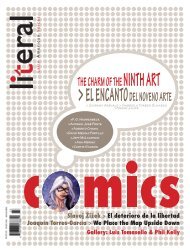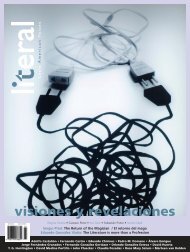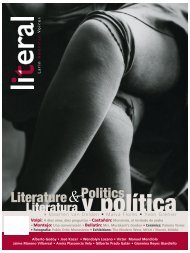Richard Serra - Literal
Richard Serra - Literal
Richard Serra - Literal
Create successful ePaper yourself
Turn your PDF publications into a flip-book with our unique Google optimized e-Paper software.
The 21 st Century Macondo<br />
n Michelle Roche<br />
This year, South American literary cliques celebrate that<br />
half a century ago, Colombian Gabriel García Márquez<br />
published the book that made our culture popular in<br />
the rest of the world: One Hundred Years of Solitude.<br />
The novel chronicles the Buendía family’s struggle in<br />
Macondo, a fi ctional town where an unpredictably<br />
wild nature and a highly conservative society sabotage<br />
progress. Alfaguara, one of the biggest Spanish publishers,<br />
has made a commemorative re-edition of this<br />
classic. It is 600 hundred pages long and contains nine<br />
scholarly essays about its importance, the story edited<br />
by its author, a glossary of terms and a Buendía family<br />
tree. Every inch of it invites to be read. I accepted the<br />
invitation and was soon stunned to discover that its<br />
issues remain current.<br />
This novel emulates today, as it did 50 years ago,<br />
the metaphorical and actual landscape of almost every<br />
settlement in the region and more importantly, the cyclic<br />
history of its inhabitants. I was confronted with the<br />
painful reality that every Latin American is an inhabitant<br />
of Macondo. It was excruciating to fi nd out that<br />
we fi t the stereotype of magical realism. The same way<br />
“orientalism” evokes the Middle East—with extremely<br />
stereotypical depictions of harems, belly dancers and<br />
pashas—magical realism evokes Latin America, a colorful<br />
region where people accept without questioning<br />
the logic of the unexpected and where the present is<br />
always a repetition of the past. Underneath the stereotype,<br />
however, Latin Americans celebrate the extraordinary<br />
as a soothing balsamic. And this is as true today<br />
as it was in the mid-1900s. An American writer was<br />
surprised when I told her that magical realism was a<br />
literary genre only for foreigners, because in my region<br />
the fantastic daily grotesque is a fact. I told her that,<br />
for example, in many towns around my native Venezuela,<br />
graveyards in cemeteries don’t have real but plastic<br />
fl owers, because goats like to eat the only solace of<br />
M<br />
the dead; that in some places of the wild Amazonian<br />
jungle plants grow overnight after you cut them; and,<br />
that every year, on October, the rainy season begins<br />
when a thunderbolt strikes over the Catatumbo, a river<br />
that fl ows into Lake Maracaibo.<br />
The resemblance to magical realism, and to One<br />
Hundred Years of Solitude, is even more remarkable<br />
in affairs of state. In fact, the political equivalent of<br />
magical realism is Latin American socialism. This form<br />
of government has seduced the region’s politicians<br />
since the 20 th century in the same way that liberalism<br />
allured men in every generation of the Buendía<br />
family.<br />
When I re-read this book a few days ago, I was<br />
alternating it with daily Venezuelan newspapers and<br />
it was after I realized I had confused three Latin presidents<br />
with Macondo inhabitants, that I assumed I was<br />
mistaking the novel’s veracity with newspapers’ fi ction.<br />
Such an exercise showed me how several leftist<br />
regimes are emerging in the region claiming to follow<br />
the example of Venezuela’s “21st century socialism,”<br />
an ambiguous political theory and a chimera because<br />
underneath its supposed new-fangled ideals lay the<br />
very old and conservative socialism. Like the liberals in<br />
Macondo, who after 20 years of war had forgotten<br />
the reason they were fi ghting for, the new socialism is<br />
just another vacant Latin American leftist ideology, a<br />
fancy way to market unattainable fantasies. There is no<br />
difference between the socialism of the 20th century<br />
and that of the 21st. Both sell the same dream: equality<br />
and wealth. And both have brought on a hopeless<br />
Latin American poverty.<br />
And, where do these leftist governments fi nd their<br />
inspiration? From Venezuela, the world’s fi fth oil exporter<br />
and the region’s ultimate Banana Republic… a<br />
country ruled by an extravagant Buendía.<br />
Hugo Chávez’s victory in the presidential election in<br />
Venezuela last December, reinvigorated his commitment<br />
to the so-called “21st century socialism”. He is a media<br />
superstar and the 21st century socialism is his international<br />
trademark; sadly, he evokes José Arcadio Buendía,<br />
the strong-willed family patriarch in García Márquez’s<br />
novel, “whose unbridled imagination always went beyond<br />
the genius of nature and even beyond miracles<br />
and magic, [and who] thought that it would be possible<br />
to make use of that useless invention [two metal ingots]<br />
to extract gold from the bowels of the earth.” Chávez’s<br />
metal ingots are his often-contradictory ideas about the<br />
OTOÑO, 2007 • LITERAL. VOCES LATINOAMERICANAS 3 47






